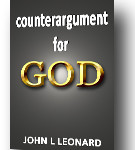Of my six published books, none have inspired more readers to offer negative feedback than my Counterargument for God.
Perhaps this is due to the fact that I routinely offer a free electronic copy to every atheist whom I encounter online — not in an attempt to antagonize them, but with the sincere hope that my book might inspire future conversation. If there is a viable alternative to rather stupendous good luck to possibly explain our existence without invoking a supernatural God, I’d like to know what that alternative might be.
I appreciate fair but constructive criticism and value it as much or more than positive feedback because I believe it is important to learn from my mistakes, so that I won’t be doomed to repeat them.
As an author it’s always nice to know that someone took the time to read what I consider to be a labor of love, even if they agree with me. Naturally, I was quite pleased to receive the email below from C. W. Bobbitt, a retired professor from Mississippi State University:
John,
I read your book Counterargument for God, some parts several times. It’s hard to believe that two people so separated in space and time could have thoughts so nearly coincident on a given subject. No doubt about it, we’re on the same page. I would not presume to tell you why you are wrong because I don’ know that you are wrong (although I call my paper a hypothesis, and I think that name is defensible, I really see it as a scenario—it could have happened this way.)
I need to state up front that my analysis of this subject is based on two propositions which I take to be axiomatlc:
1. God created the universe and all life in it.
2. Science, by definition, does not admit of the supernatural in any way.
If I understand your book correctly, you agree with the first one, but have a different notion about the second one. This represents a major difference in viewpoint but a trivial difference in our common understanding. We both are convinced that God created the universe and the life in it, only our terminology is different: you say stardust, I say protocell; you say iterative creation, I say internal evolution. We’re saying the same thing, just using different words.
In a later communication I will discuss all the points you raised in your review of my paper, but for the present I will confine myself to your question ” What about the origin of the universe itself? Isn’t that relevant?” It most certainly is! I really didn’t realize how important this was until I saw the seriousness with which you took it, then I was led to make a literature review (on the internet, of course) and found to my great suprise that apparently no one has a clue as to how the universe began. The scientists are at a terrible disadvantage since they have cut themselves off from the opportunity of invoking a supernatural cause.
In my review I ran across Hawking’s lecture on the origin of the universe and was much impressed, especially by the way he hedged his bets by suggesting that maybe God was the only answer after all. Clever man.
It slowly dawned on me that it is necessary to have a plausible explanation for how the universe came into being in order to figure out how it subsequently progressed. The explanation doesn’t have to be true (what is that you say repeatedly, “what is truth?”), it just has to satisfy our mortal curiosity enough to move on. I think I have found an acceptable explanation.
Four or five years ago, when my paper was coming together, I wrote a couple of short notes solely for my own pleasure having to do with how the universe might have originated, and other things. At the time I described my idea for the birth of the universe as bizarre, but after much reading I now consider it to be the most plausible scenario, if not the only one.
I will send you these notes tonight or tomorrow. I’ve got to get organized.
Now that professor Bobbitt has organized his thoughts and shared them with me, I have decided (with his permission) to share them with interested readers in the hope that others with similar interest in answering the existential questions might contribute to our discussion at some point, keeping in mind it is not necessary to agree with either of us.
Professor Bobbitt was correct: I agree completely with his first point — the evidence overwhelmingly suggests that a supernatural creator God was involved in the origin of the universe, the origin of life, and even the origin of species. However, it was not a postulate that influenced my analysis of the evidence for the Big Bang, but a conclusion reached based on an evaluation of that evidence.
The only change I would make to his second point would be to make clear that it is “atheists pretending to be scientists” who do not allow for the possibility of the supernatural, and not science itself.
The scientific method is nothing more than an approach to collecting evidence. Science cannot be biased one way or the other.
Next, we shall compare professor Bobbitt’s thoughts on the origin of the universe to my Big Picture analysis of the Big Bang. Please, don’t be shy.
Professor Bobbitt and I will appreciate your feedback via comments.


This is cool! I will have to stay tuned because I really enjoyed your book and have recommended it to a few others. Now this professor is getting in the game. Terrific! More people need to find and read your book! Thanks, Andy